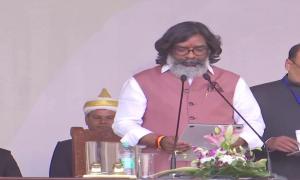In our case, the problem got recognised before it became a crisis, and the Central government switched to a defined contribution scheme for future employees, effective from January 1, 2004.
Many state governments have followed suit. But, even as we come to the end of 2005, the enabling legislation is still to be placed before Parliament - and will not be, even in the current session, because of opposition from the Leftist allies of the United Progressive Alliance.
In the meantime, contributions to the new scheme are being deducted and reports indicate that over 100,000 employees are already its members. The scheme accounts are apparently being maintained in an ad hoc, temporary form by the Controller General of Accounts and the funds disappearing in the ocean of public finances.
A more permanent accounting and fund management system will have to await the passage of the Pension Bill! In the meantime, it is anybody's guess to what extent the accounts are in a mess.
Problems of reconciliation leading to frauds, defalcation and corruption surely will crop up one day -- as it is, provident fund employees often need to be paid under the table before the beneficiary can get his money.
The Telgi stamp paper scam is surely an example of how the loopholes can be exploited. Indeed, tardy and inefficient implementation of schemes has always been, and remains, the bane of even good policies. The new pension scheme is unlikely to be an exception.
Curiously, even as most analysts remain sceptical about the honest and efficient implementation of the employment guarantee scheme (recall the mess in Maharashtra's scheme, despite its being one of the better administered states), the UPA announced its intention to start a pension scheme for workers in the unorganised sector.
Surely, we should wait at least till the much more limited new pension scheme has some kind of functioning accounting and fund management structure?
This is, of course, not to deny that the workers in the unorganised sector need some kind of retirement benefits: 89 per cent of the population remains dependent on the age-old joint family system, which is breaking down. And, the number of senior citizens is growing rapidly with increase in life expectancy, and is estimated at 80/85 million now.
But the question is about the administrative and financial feasibility of providing them retirement benefits now.
To be sure, the problem of pensions is not peculiar to India - indeed, in some ways it is much more virulent in Japan and the European countries experiencing falling populations, simultaneously with an increasing number of retirees.
It may be recalled that social security, unemployment, medical benefits and so on, came to be introduced in much of the developed countries, at least partially as a response to Karl Marx's Communist Manifesto and as a means of demonstrating to the working class that capitalistic democracies can also meet social obligations to the relatively worse off.
However, in recent years there has been a dramatic shift in both the economics and the politics of social security. The proportion of working people to retirees has been falling in most industrial countries other than the US (thanks to immigration).
At some stage, the issue of one generation's burdens having to be met by the next could become politically sensitive. In any case, fiscal resources are running increasingly short of meeting the pension burden. As for private, that is, corporate, pensions, many funds have sustained losses as they had invested significantly large proportion in equities.
But this has led to increased liabilities for the employers, which the companies are finding it difficult to meet in the face of global competition - one of the major reasons for the junk rating of General Motors is the legacy cost of pensions and health benefits for retired employees.
With stronger accounting standards, the cost of pensions to corporate balance sheets is becoming a big issue: as a corollary, more funds are investing into structured products and derivatives to increase earnings.
The German Postbank has come out with a very popular capital protected investment scheme, which is, in effect, a pension account, with partial equity investments, for an individual - but capital is protected only if the account holder keeps up with the scheme for 35 years. Even conservative Germans are liking the idea.
It will be a long time before the issues get resolved. Meantime, back home, whatever the political differences about the pension scheme, surely steps need to be taken to strengthen the accounting and fund management before it is too late.









More from rediff